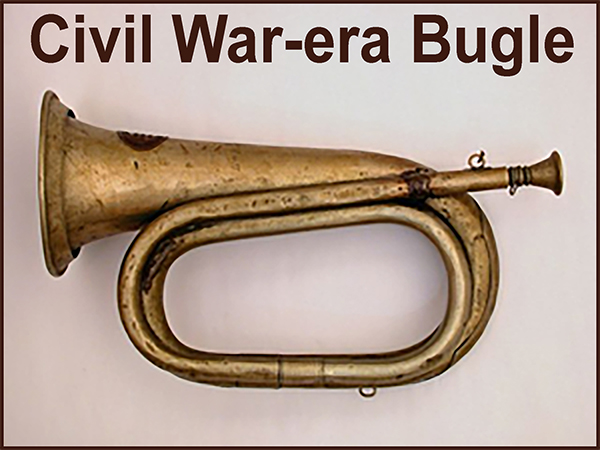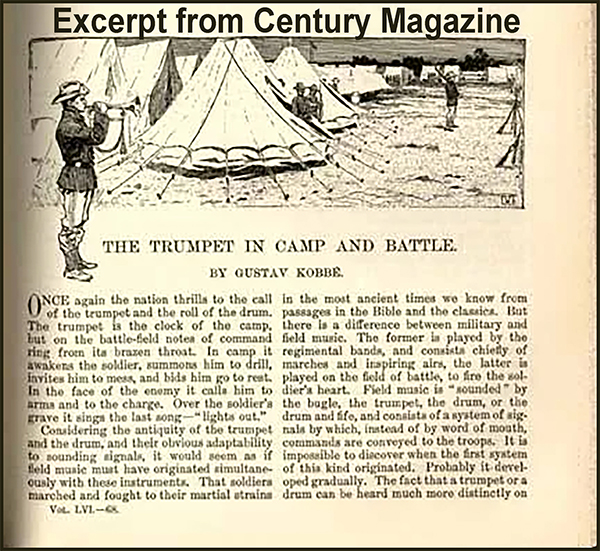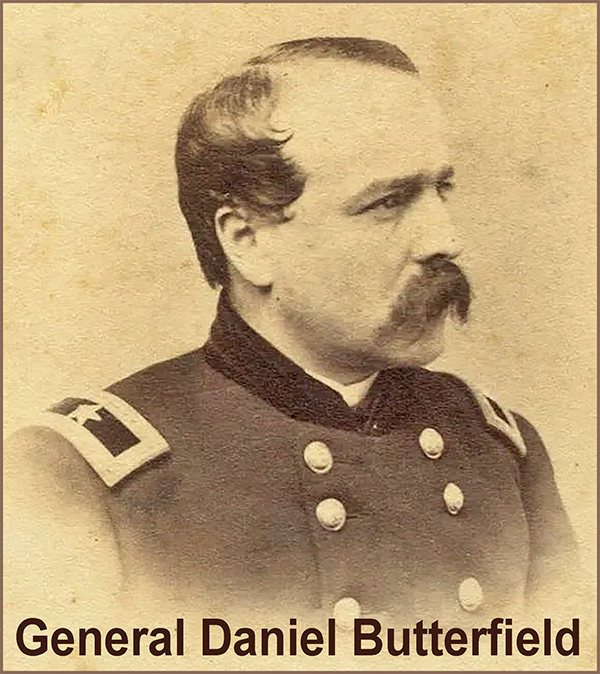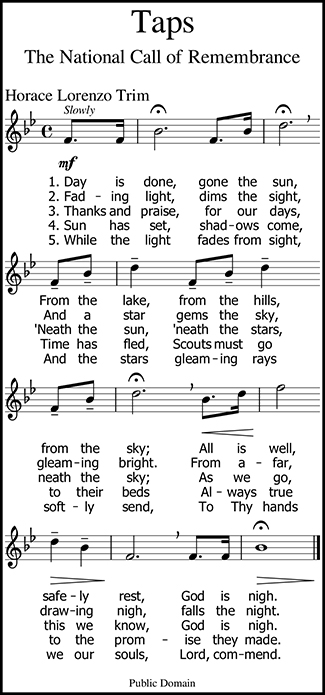 Day is done, gone the sun,
Day is done, gone the sun,
From the hills, from the lake, from the skies.
All is well, safely rest, God is nigh.
These are the most recognized words to the most recognized military bugle call, the one that will pull at your heartstrings at the sound of the first two notes. Taps is sounded at memorial services, wreath-laying ceremonies, and funerals, but it’s first use was for “Lights Out.”
 Until the Civil War, another tune was used, a tune that originated in France. Union General Daniel Butterfield changed that with his Third Brigade (Third Brigade, First Division, Fifth Army Corps, Army of the Potomac).
Until the Civil War, another tune was used, a tune that originated in France. Union General Daniel Butterfield changed that with his Third Brigade (Third Brigade, First Division, Fifth Army Corps, Army of the Potomac).
According to several sources, General Butterfield did not like the call for Lights Out. He felt it was too formal. He worked with the brigade bugler, Oliver Wilcox Norton, to write something new. It was first used at the Seven Day’s battle at Harrison’s Landing, Virginia in July 1862. The song soon spread to other units of the Union Army and was also used by the Confederates. Taps was made an official bugle call after the war.
Century Magazine Account
The following information was obtained from https://www.ausa.org/history-taps, written by MSG Jari A. Villanueva, USAF.
 According to MSG Villanueva, the August, 1898 issue of Century Magazine contained an article called The Trumpet in Camp and Battle, by Gustav Kobbe, a music historian and critic. In the article, he wrongly identified the origin of Taps. Oliver W. Norton sent a response.
According to MSG Villanueva, the August, 1898 issue of Century Magazine contained an article called The Trumpet in Camp and Battle, by Gustav Kobbe, a music historian and critic. In the article, he wrongly identified the origin of Taps. Oliver W. Norton sent a response.
Chicago, August 8, 1898
I was much interested in reading the article by Mr. Gustav Kobbe, on the Trumpet and Bugle Calls, in the August Century. Mr. Kobbe says that he has been unable to trace the origin of the call now used for Taps, or the Go to Sleep, as it is generally called by the soldiers. As I am unable to give the origin of this call, I think the following statement may be of interest to Mr. Kobbe and your readers….
During the early part of the Civil War I was bugler at the Headquarters of Butterfield’s Brigade, Meroll’s Division, Fitz-John Porter’s Corp, Army of the Potomac. Up to July, 1862, the Infantry call for Taps was that set down in Casey s Tactics, which Mr. Kobbe says was borrowed from the French. One day, soon after the seven days battles on the Peninsular, when the Army of the Potomac was lying in camp at Harrison’s Landing, General Daniel Butterfield, then commanding our Brigade, sent for me, and showing me some notes on a staff written in pencil on the back of an envelope, asked me to sound them on my bugle.
I did this several times, playing the music as written. He changed it somewhat, lengthening some notes and shortening others, but retaining the melody as he first gave it to me. After getting it to his satisfaction, he directed me to sound that call for Taps thereafter in place of the regulation call. The music was beautiful on that still summer night and was heard far beyond the limits of our Brigade.
The next day I was visited by several buglers from neighboring Brigades, asking for copies of the music which I gladly furnished. I think no general order was issued from army headquarters authorizing the substitution of this for the regulation call, but as each brigade commander exercised his own discretion in such minor matters, the call was gradually taken up through the Army of the Potomac.
I have been told that it was carried to the Western Armies by the 11th and 12th Corps when they went to Chattanooga in the fall of 1863 and rapidly made its way through those armies. I did not presume to question General Butterfield at the time, but from the manner in which the call was given to me, I have no doubt he composed it in his tent at Harrison’s Landing.
I think General Butterfield is living at Cold Spring, New York. If you think the matter of sufficient interest, and care to write him on the subject, I have no doubt he will confirm my statement. – Oliver W. Norton
Butterfield’s Response
The editor reached out to Butterfield and received this reply on August 31, 1898.
 I recall, in my dim memory, the substantial truth of the statement made by Norton, of the 83rd Pa., about bugle calls. His letter gives the impression that I personally wrote the notes for the call. The facts are, that at the time I could sound calls on the bugle as a necessary part of military knowledge and instruction for an officer commanding a regiment or brigade. I had acquired this as a regimental commander.
I recall, in my dim memory, the substantial truth of the statement made by Norton, of the 83rd Pa., about bugle calls. His letter gives the impression that I personally wrote the notes for the call. The facts are, that at the time I could sound calls on the bugle as a necessary part of military knowledge and instruction for an officer commanding a regiment or brigade. I had acquired this as a regimental commander.
I had composed a call for my brigade, to precede any calls, indicating that such were calls, or orders, for my brigade alone. This was of very great use and effect on the march and in battle. It enabled me to cause my whole command, at times, in march, covering over a mile on the road, all to halt instantly, and lie down, and all arise and start at the same moment; to forward in line of battle, simultaneously, in action and charge etc. It saves fatigue.

The men rather liked their call, and began to sing my name to it. It was three notes and a catch. I can not write a note of music, but have gotten my wife to write it from my whistling it to her, and enclose it. The men would sing , “Dan, Dan, Dan, Butterfield, Butterfield” to the notes when a call came. Later, in battle, or in some trying circumstances or an advance of difficulties, they sometimes sang, “Damn, Damn, Damn, Butterfield, Butterfield”.
The call of Taps did not seem to be as smooth, melodious and musical as it should be, and I called in some one who could write music, and practiced a change in the call of Taps until I had it suit my ear, and then, as Norton writes, got it to my taste without being able to write music or knowing the technical name of any note, but, simply by ear, arranged it as Norton describes. I did not recall him in connection with it, but his story is substantially correct. Will you do me the favor to send Norton a copy of this letter by your typewriter? I have none. – Daniel Butterfield
Historical Accuracy
It appears General Butterfield did not compose Taps, but that he revised an earlier call into the one we know today. Regardless of its true origin, this simple and profound tune has lived, with a variety of verses, for over 160 years.
